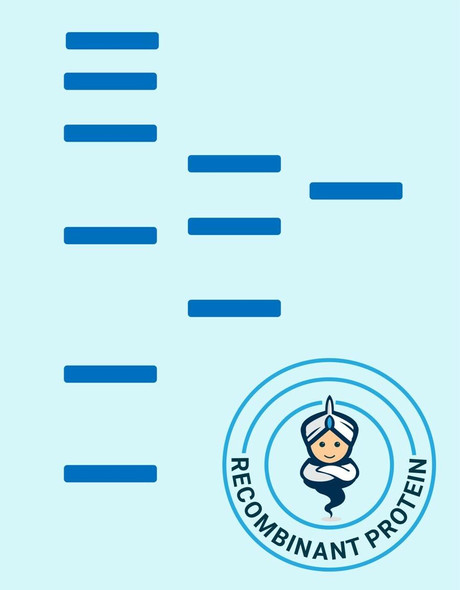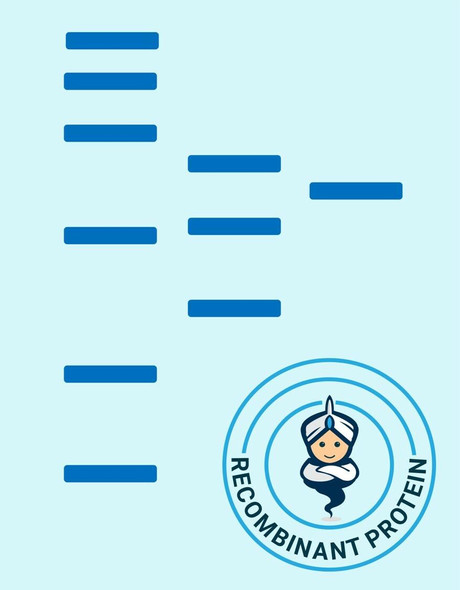Human MDC Recombinant Protein (RPPB1201)
- SKU:
- RPPB1201
- Product Type:
- Recombinant Protein
- Species:
- Human
- Uniprot:
- O00626
- Research Area:
- Chemokines
Description
| Product Name: | Human MDC Recombinant Protein |
| Product Code: | RPPB1201 |
| Size: | 20µg |
| Species: | Human |
| Target: | MDC |
| Synonyms: | C-C motif chemokine 22, Small-inducible cytokine A22, Macrophage-derived chemokine, MDC(1-69), Stimulated T-cell chemotactic protein 1, CC chemokine STCP-1, CCL22, MDC, SCYA22, ABCD-1, DC/B-CK, MGC34554, A-152E5.1. |
| Source: | Escherichia Coli |
| Physical Appearance: | Sterile filtered colorless solution. |
| Formulation: | The MDC protein contains phosphate-buffered Saline (PBS) pH7.4 and 10% glycerol. |
| Stability: | Store at 4°C if entire vial will be used within 2-4 weeks. Store, frozen at -20°C for longer periods of time. For long term storage it is recommended to add a carrier protein (0.1% HSA or BSA). Avoid multiple freeze-thaw cycles. |
| Purity: | Greater than 95% as determined by Analysis by SDS-PAGE. |
| Amino Acid Sequence: | MGSSHHHHHH SSGLVPRGSH MGPYGANMED SVCCRDYVRY RLPLRVVKHF YWTSDSCPRP GVVLLTFRDK EICADPRVPW VKMILNKLSQ |
MDC (CCL22) is a small cytokine that belongs to the CC chemokine family. CCL22 is one of several Cys-Cys (CC) cytokine genes clustered on the q arm of chromosome 16. MDC shows chemotactic activity for natural killer cells, chronically activated T lymphocytes, monocytes and dendritic cells. On the other hand, MDC shows a mild activity for primary activated T lymphocytes and has no chemoattractant activity for neutrophils, eosinophils and resting T lymphocytes. MDC may also have a role in the trafficking of activated T lymphocytes to inflammatory sites and other aspects of activated T lymphocyte physiology. MDC interacts with cell surface chemokine receptors CCR4. CCL22 is vastly expressed in macrophage and in monocyte-derived dendritic cells, and thymus. CCL22 is also found in the lymph node, appendix, activated monocytes, resting and activated macrophages. Lower expression of CCL22 can be seen in the lung and the spleen and very weak expression in the small intestine. In the lymph node CCL22 is expressed in a mature subset of Langerhans' cells (CD1a+ and CD83+). Furthermore, CCL22 is expressed in atopic dermatitis, allergic contact dermatitis skin, and psoriasis, in both the epidermis and dermis. In addition, MDC has a role in hindering progression of lung cancer. Moreover, significantly higher CCL22 expression is linked to gastric cancer.
MDC Human Recombinant produced in E.Coli is a non-glycosylated, Polypeptide chain containing 90 amino acids (25-93 a.a.) and having a molecular mass of 10.3 kDa. The MDC is fused to 20 amino acid His-Tag at N-terminus purified by proprietary chromatographic techniques.
| UniProt Protein Function: | CCL22: May play a role in the trafficking of activated/effector T-lymphocytes to inflammatory sites and other aspects of activated T-lymphocyte physiology. Chemotactic for monocytes, dendritic cells and natural killer cells. Mild chemoattractant for primary activated T-lymphocytes and a potent chemoattractant for chronically activated T-lymphocytes but has no chemoattractant activity for neutrophils, eosinophils, and resting T-lymphocytes. Binds to CCR4. Processed forms MDC(3-69), MDC(5-69) and MDC(7-69) seem not be active. Belongs to the intercrine beta (chemokine CC) family. |
| UniProt Protein Details: | Protein type:Secreted; Motility/polarity/chemotaxis; Secreted, signal peptide; Chemokine Chromosomal Location of Human Ortholog: 16q13 Cellular Component: extracellular space; extracellular region Molecular Function:chemokine activity Biological Process: cell-cell signaling; response to virus; immune response; chemotaxis; inflammatory response; signal transduction |
| NCBI Summary: | This antimicrobial gene is one of several Cys-Cys (CC) cytokine genes clustered on the q arm of chromosome 16. Cytokines are a family of secreted proteins involved in immunoregulatory and inflammatory processes. The CC cytokines are proteins characterized by two adjacent cysteines. The cytokine encoded by this gene displays chemotactic activity for monocytes, dendritic cells, natural killer cells and for chronically activated T lymphocytes. It also displays a mild activity for primary activated T lymphocytes and has no chemoattractant activity for neutrophils, eosinophils and resting T lymphocytes. The product of this gene binds to chemokine receptor CCR4. This chemokine may play a role in the trafficking of activated T lymphocytes to inflammatory sites and other aspects of activated T lymphocyte physiology. [provided by RefSeq, Sep 2014] |
| UniProt Code: | O00626 |
| NCBI GenInfo Identifier: | 311033357 |
| NCBI Gene ID: | 6367 |
| NCBI Accession: | O00626.2 |
| UniProt Secondary Accession: | O00626,A0N0Q6, B2R4W2, |
| UniProt Related Accession: | O00626 |
| Molecular Weight: | 10,625 Da |
| NCBI Full Name: | C-C motif chemokine 22 |
| NCBI Synonym Full Names: | chemokine (C-C motif) ligand 22 |
| NCBI Official Symbol: | CCL22�� |
| NCBI Official Synonym Symbols: | MDC; ABCD-1; SCYA22; STCP-1; DC/B-CK; A-152E5.1�� |
| NCBI Protein Information: | C-C motif chemokine 22; MDC(1-69); CC chemokine STCP-1; macrophage-derived chemokine; small inducible cytokine A22; small-inducible cytokine A22; stimulated T cell chemotactic protein 1; stimulated T-cell chemotactic protein 1; small inducible cytokine subfamily A (Cys-Cys), member 22 |
| UniProt Protein Name: | C-C motif chemokine 22 |
| UniProt Synonym Protein Names: | CC chemokine STCP-1; MDC(1-69); Macrophage-derived chemokine; Small-inducible cytokine A22; Stimulated T-cell chemotactic protein 1Cleaved into the following 3 chains:MDC(3-69); MDC(5-69); MDC(7-69) |
| UniProt Gene Name: | CCL22�� |
| UniProt Entry Name: | CCL22_HUMAN |









